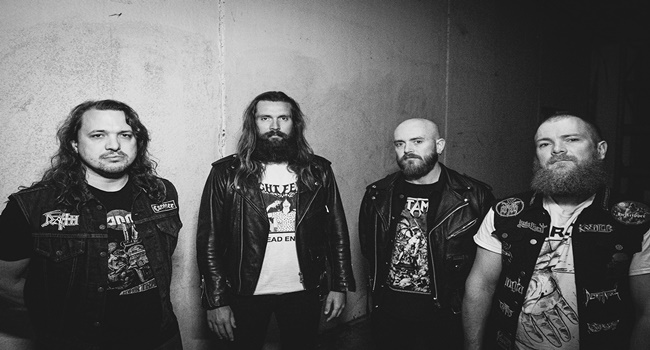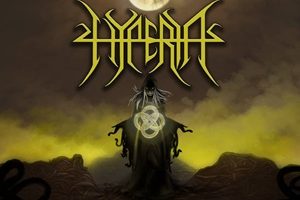Terminalist – Beware of Crisis
Tuesday, 29th August 2023
Photo: Theis Wilmer Poulsen
Dubbing themselves ‘hyperthrash’, Danish band Terminalist injects a progressive mindset in their style – incorporating elements across the heavy/extreme genres from black to melodic influences. Their second album The Crisis as Condition has quite an adventurous outlook on both the lyrical and musical fronts – plenty of tasty riffs, interplay movements, and this overall sense of advanced skill sets that you rarely hear in this genre. We reached out to vocalist/guitarist Emil Hansen via Zoom the night after his band got the pleasure to open for Voivod in Denmark, to learn more about that experience, the differences between the two studio albums in terms of content/approach, special albums from bands like Rainbow, Slayer, Vektor, and Ashenspire, thoughts on the climate crisis and how people can make a change even on a small level, plus future plans.
Dead Rhetoric: How did the show go recently opening for Voivod in Denmark? Was it a dream come true to open for a legendary band like that, and do you believe your music translated well to their audience?
Emil Hansen: It was a major honor to be provided the chance to support a band of that caliber. I wasn’t surprised to find out they were awfully nice people, so incredibly mild and easy to hang out with. They put on a great show, and I’m amazed by how they can keep that standard after forty years in the game. So it was a great experience overall.
In Terminalist, we often get compared to Voivod, and the similarities are obvious. The first album we did was very sci-fi-oriented and we come from a direct lineage that starts with them but they actually haven’t been a primary inspiration – I usually say we have more of a second-hand influence by them.
Dead Rhetoric: The second album for Terminalist is The Crisis As Condition – recorded once again with Lasse Ballade at his studios in Copenhagen. How did the songwriting and recording sessions go for this set of material – and where do you see the differences or growth of the band from your previous album of 2021 The Great Acceleration?
Hansen: You can say the songwriting process was very much in line with the theme and concept of the record since it was very stressful to make this one. We were a bit fast to agree when we would hit the studio, and that rushed the songwriting. But sometimes, you need a sharp deadline to really put in the work and that’s what we did. I think the record has turned out excellent and personally believe it’s better than the first one – it’s more focused, especially in the musical direction we are outlining. On The Great Acceleration, we had a bit more death metal and black metal influences which suited the interstellar theme but this one is way more thrash-oriented. There are still plenty of prog elements and blast beats which altogether creates the sound that we coined called hyper-thrash. It’s more in line with my primary sources of inspiration as well and I’m proud of this direction and how this has turned out. We will see how people respond when it’s released.
Dead Rhetoric: The lyrical content this time around was more reality-based, especially focusing on contemporary crisises that you feel are not temporary but more permanent based. Discuss the importance of the subject matter you wanted to explore, and how it complements the technical thrash-oriented musical components?
Hansen: I usually like when there is a strong connection between the sound of the music and the lyrical content. In my mind, it made more sense with the musical direction being more to the thrashy side, to also have the lyrical content be in line with the thrash tradition. Thrash metal in its origins was partly derived from punk, and a lot of the social/ political themes from the hardcore punk scene were adopted into the lyrical content as well. That element has, in my opinion, been lacking in thrash metal for a long time now. And while this was not intended to be a sort of activist record, there is a lot of commentary on there that translates well with the sound and style that we play. In my mind, it didn’t make sense to write another album with sci-fi themes when our present is as fucked up as it is. It made a lot more sense coming out of the COVID crisis, seeing the invasion of the Ukraine, and witnessing the consequences of the accelerating climate crisis to also have the record be about this. Crisis is the buzzword of the time and it made sense to mix that lyrical concept with this kind of music.
Dead Rhetoric: Does your approach differ in developing songs like “A Future to Weave” or “Frenetic Standstill” versus the epic closer “Move in Strife” – is one easier than the other, or does the development and refinement take longer to get just right for the latter, longer arrangement?
Hansen: That’s a pretty good question, actually. Sometimes when you start writing a song, it seems like you have to start all the way over with your method and approach. At other times, it translates easily and you get into a vibe where the ideas keep bouncing off of each other and where some sort of structure presents itself. It can turn into a long song quite quickly, if you have enough ideas. My challenge really has been to write shorter songs. On the first album, we only had five songs with two of them being around 10 minutes, so it was a specific goal on this album to have some more compact and precise songwriting, if you will.
“A Future to Weave” is the shortest song on the record and it was actually not that hard to write. It’s a riff-fest and the vibe was there from the get-go so the process was pretty flawless. “Frenetic Standstill”, on the other hand, was written by the other guitarist, Morten, who provided the full riff structure and ideas, and then we just expanded on that and added some more details before I wrote some lyrics I thought complimented the sound and drive from the song.
So, I know I just said that it can seem easier to write lengthier songs sometimes but “Move in Strife”, our 10-minute album closer, took a really long time to finish. Some of the first ideas we had when going into the writing process actually ended up here but at the same time, it was also the last song we finished. At five or six minutes into the song, we have a very sharp breaking off point, we go into this slow tempo, and each instrument slowly takes off in different directions. We wanted it to have a more jammy and improvised feel but eventually ended up writing the role for each part. That was the last thing we did in the songwriting process so the road to get there was long but it came out really well at the end.
Dead Rhetoric: British painter Ryan T. Hancock did the cover art again for Terminalist. How does the concept work between yourselves and Ryan to flesh out the final piece we see – and what do you enjoy most about his approach for the band?
Hansen: It was quite complicated actually. Luckily, Ryan is such a talented guy and easy to work with. He did a tremendous job on the first record; it might be easier to have a whole universe of science fiction imagery to rely on when you are dealing with that kind of concept. With this one, it was harder since the concept of crisis is way more abstract. I mean, how do you paint a crisis? I tried to twist the idea in my head for some time, and I didn’t know how I would approach it myself. We had some discussions about this in the band, and we brought these questions to Ryan. We have this music, this is the lyrical concept – how would you approach this? What kind of ideas do you get? He started doing some sketches, of which we liked one in particular with a tilted angle, and we exchanged images and paintings that we each liked and which might serve as an inspiration. One of the great things about working with Ryan is that not only is he a brilliant creative mind, he also isn’t afraid to pull in references from less obvious places. We talked about images with a lot of texture, like the artwork for the latest Sunn O))) records, Pyroclasts and Life Metal, we talked about the aesthetics of the ‘Mad Max’ films and then I brought in the painting ‘The Destruction of Sodom and Gomorrah’ from 1852 by the British painter John Martin. You can actually tell from the final piece that these different works of art were visual guidelines and sources of inspiration.
We wanted to be something more down to earth for the motive that would also show that this is not a space-themed record like the first one. It ended with this cloud of light that sort of wrecks the earth in two. It could be a symbol for a lot of stuff – is it an alien invasion? Is it a nuclear bomb? Is it a meteor? A natural phenomenon? What is it exactly? It’s up for interpretation, luckily, and that was the kind of message we wanted to convey.
Dead Rhetoric: What are your thoughts on Indisciplinarian as your record label – and how they’ve been able to expand the promotion and following for Terminalist through their efforts?
Hansen: Indisciplinarian are doing a hell of a job. They have a sharp profile with focus on high quality and artistic integrity and this not only shows in their selection of bands but also in the way they handle promotion and physical products. They’re probably the best label in Denmark, I believe, when it comes to generating press coverage. On our first album, we got coverage in major newspapers and print outlets here in Denmark which is quite rare for a debuting metal band. So we’re very fond of the cooperation and very honored to be part of their roster.
Dead Rhetoric: What do you see as some of the biggest challenges Terminalist faces at this point in your career to establish more of a foothold in the scene, not only locally within Denmark but on a global scale?
Hansen: We still have some work to do with our live shows. The next big step is to go abroad. We haven’t played outside of Denmark yet which is mandatory if you want international longevity as well so that’s the focus for the coming time.
Dead Rhetoric: What do you consider three of the most important metal albums that helped shape your outlook on the genre?
Hansen: Oh, there are many. Probably one of the best records of all time in my opinion would be Rising by Rainbow. It’s one that I always could come back to. I could mention some Deep Purple albums as well but Rising is such an amazing continuation of what Ritchie Blackmore did in Deep Purple, and the way he expanded upon it with Ronnie James Dio, Cozy Powell, and Jimmy Bain showed a future direction for the whole genre. It’s a classic record in every way. Then I would also say Reign in Blood by Slayer. It’s not a record that I listen to often but it’s still one of the greatest thrash records ever written. The last one would be Terminal Redux by Vektor which laid the foundation for Terminalist. If that album hadn’t been released, this band probably wouldn’t exist, or at least sound like this at all. I can honestly say that that record changed my life. Can I mention a fourth one? Then I’d like to point out the Scottish band Ashenspire who released an album last year called Hostile Architecture. It’s a prog, black metal, experimental kind of record – very dissonant and challenging with some very poignant and strong social and political commentary. In my opinion, it is one of the most important and accomplished metal records in recent years.
Dead Rhetoric: What worries or concerns you most about the world that we live in today? Where do you think the average person needs to put more focus / attention on to make things better for society as a whole?
Hansen: That’s a big one, huh! (laughs). I don’t even know if my opinion on this matters at all. We all hold different opinions and values, and all have our inalienable rights and I’m not necessarily one to tell others what to do. But I think it’s very clear that we face a lot of issues on different levels – personally, nationally, globally – that are connected in different ways and which we need to address both as individuals and societies. I have a lot of concerns that come through on this record, a major one being centered around the overarching climate crisis which keeps accelerating, apparently with no end in sight since global emissions of greenhouse gasses are still on the rise, even with rapid action being taken in some places towards an energy transition. It’s scary, not just in the way our own emissions drive up temperatures, create extreme weather and erode living conditions around the globe but also in the way in which the crisis exposes our own powerlessness. It doesn’t matter what I do as an individual if there is no collective or political action being taken. The climate crisis poses an existential threat to our way of living, and it threatens to tear entire societies apart if living conditions worsen and fights over natural resources escalate in the coming decades. The science on this is clear: the emission of greenhouse gasses and the reliance on fossil fuels needs to end but this is something that can only be addressed and carried out collectively. And it seems like the mere possibility of collective action and decision making, on local levels as well as global ones, is challenged in these years. We need strong institutions that can address these issues on a global, wide-reaching scale but it seems like the institutions we have are all facing problems that question their legitimacy or their ability to even carry out any kind of governance. That’s a major factor in my pessimism. It seems at times we have lost the will or even the ability to cooperate.
So, what can you do about it? You can take action where you have influence and agency. Seek out information, not from pundits and conspirators, but from valid and legitimate sources and use it to hold your surroundings accountable. Otherwise, nothing is ever going to change. That’s one way to look at it, at least.
Dead Rhetoric: What’s on the agenda for anything related to Terminalist over the next twelve months? Do the members have any other side projects/outfits that we also need to pay attention to?
Hansen: No side projects currently. Our bass player, Kalle Tiihonen, has a folk project he spends some time on. How far he is with it by now, I’m not sure. The next step is to promote this record all we can. Hopefully it will elicit a reaction and maybe even spark some thoughts amongst our listeners. I would love to see people engage with this, not just the music but the lyrics as well.

























